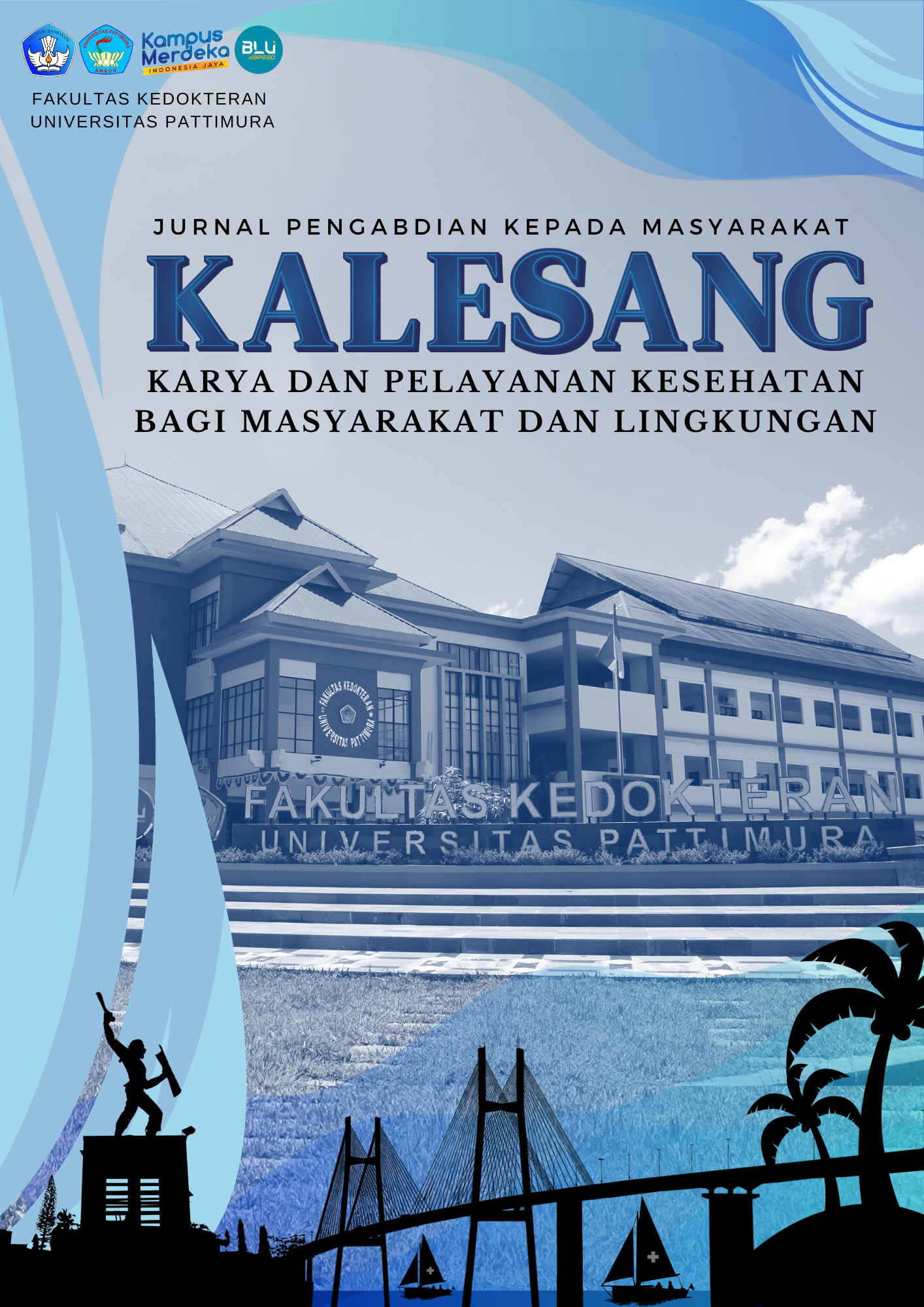Edukasi Sindrom Metabolik di Desa Laehari, Leitimur Selatan, Kota Ambon
Education of Metabolic Syndrome in Leahari Village, South Leitimur, Ambon
Abstract
Metabolic syndrome is a global pandemic caused by obesity, insulin resistance, dyslipidemia, and hypertension. Maluku Province is known to have great potential for increasing the prevalence of metabolic syndrome in the community starting from an early age. Metabolic syndrome has various risk factors including lifestyle such as diet, alcohol consumption, smoking routines, and physical activity. The purpose of this community service activity is to increase knowledge about the negative impacts of metabolic syndrome through education related to non-communicable diseases of metabolic syndrome. It is hoped that this activity can change people's attitudes and behavior toward high-risk non-communicable diseases related to metabolic syndrome. This activity was conducted well on May 24, 2024, in Leahari Village, South Leitimur District, Ambon City with 62 participants. The stages of the activity began with participant registration, measuring weight and height, and checking blood pressure, followed by health education and administering pre-post tests. The results of the recapitulation of participants' weight and height were still within proportional limits, the results of blood pressure checks showed that the average blood pressure was 118/79 mmHg. The results of the pre-post test showed that respondents had good knowledge about metabolic syndrome. This can also be seen during the discussion and question and answer session, respondents could answer questions asked by the speaker. It is hoped that with increased knowledge, it can change people's behavior which can be a risk factor for non-communicable diseases of metabolic syndrome.
Downloads
References
Kementerian Kesehatan Republik Indonesia. Rencana Strategis (Renstra) Kementerian Kesehatan Tahun 2020-2024 (revisi 2022). Jakarta: Kementerian Kesehatan Republik Indonesia; 2022.
Osei-Yeboah J, Owiredu WKBA, Norgbe GK, Lokpo SY, Gyamfi J, Allotey EA, et al. The prevalence of metabolic syndrome and Its components among people with type 2 diabetes in the Ho Municipality, Ghana: a cross-sectional study. Int J Chronic Dis. 2017;2017:1–8.
van Vliet-Ostaptchouk JV, Nuotio ML, Slagter SN, Doiron D, Fischer K, Foco L, et al. The prevalence of metabolic syndrome and metabolically healthy obesity in Europe: A collaborative analysis of ten large cohort studies. BMC Endocr Disord. 2014;14(9):1-13.
Listyandini R, Pertiwi FD. Asupan makan, stress, dan aktivitas fisik dengan sindrom metabolik pada pekerja di Jakarta. J Kaji Pengemb Kesehat Masy. 2020;1(1):19–32.
Badan Penelitian dan Pengembangan Kesehatan. Laporan Riskesdas Maluku 2018. Jakarta: Lembaga Penerbit Badan Penelitian dan Pengembangan Kesehatan; 2019. p.135–136.
Mittal K, Mishra R, Aggarwal HK, Patki V. Book review: Point of care testing: principles and clinical applications. J Pediatr Crit Care. 2018;5(4):94.
Dinas Komunikasi dan Persandian Kota Ambon. Statistik Sektoral Kota Ambon Tahun 2024. Ambon: Dinas Komunikasi dan Persandian Kota Ambon; 2024.
Lee MK, Han K, Kim MK, Koh ES, Kim ES, Nam GE, et al. Changes in metabolic syndrome and its components and the risk of type 2 diabetes: a nationwide cohort study. Sci Rep. 2020;10(1):1–8.
Ezika EA, Ezika AN. Transtheoretical model as a framework for promoting cardiovascular health through behaviour change: a systematic review. Int Res J Public Heal. 2020;4(46).
Angelia S, Noor Z, Sanyoto D, Suhartono E. Analisis efektivitas metode ceramah dan demonstrasi terhadap pengetahuan, sikap dan praktik upaya pencegahan anemia pada remaja putri: studi di wilayah kerja Puskesmas Bukit Hindu Kota Palangka Raya. J Ners. 2024;8(1):553–7.
Walters R, Leslie SJ, Polson R, Cusack T, Gorely T. Establishing the efficacy of interventions to improve health literacy and health behaviours: a systematic review. BMC Public Health. 2020;20(1):1–17.
American Diabetes Association. Facilitating behavior change and well-being to improve health outcomes: Standards of Medical Care in Diabetes-2020. Diabetes Care. 2020;43(Suppl 1):S48–65.
Wang HH, Lee DK, Liu M, Portincasa P, Wang DQH. Novel insights into the pathogenesis and management of the metabolic syndrome. Pediatr Gastroenterol Hepatol Nutr. 2020;23(3):189–230.
Svendsen MT, Bak CK, Sørensen K, Pelikan J, Riddersholm SJ, Skals RK, et al. Associations of health literacy with socioeconomic position, health risk behavior, and health status: A large national population-based survey among Danish adults. BMC Public Health. 2020;20(1):1–12.
Travers JL, Hirschman KB, Naylor MD. Adapting Andersen’s expanded behavioral model of health services use to include older adults receiving long-term services and supports. BMC Geriatr. 2020;20(1):1–16.
Kirtchuk L, Wylie A. Social and environmental determinants of health. A Prescr Heal Living A Guid to Lifestyle Med. 2021;1:3–15.
Copyright (c) 2024 The Author(s)

This work is licensed under a Creative Commons Attribution-ShareAlike 4.0 International License.






